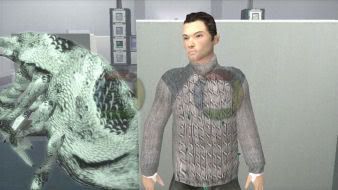Fahrenheit

Are games growing up? Is there a new generation of games emerging that rely on character and narrative suspense to provide on-screen tension, as opposed to kung-fu and marauding aliens? Ostensibly an adventure game, David Cage's Fahrenheit could be seen as a significant turning point in games coming round to integrate more complex ideas and new focuses in interactive story-telling.
The beauty of Fahrenheit lies in its exposition. We begin the game as Lucas Kane, a young man with more than a passing resemblance to Shenmue's Ryu. Late one night in the toilets of a New York diner, Lucas inexplicably kills a stranger. The game then switches to follow Carla Valenti and Tyler Miles, a pair of detectives investigating the case. What happens then is a brilliantly imaginative twist: as we follow both killer and cops, our sympathies are increasingly torn between Lucas's bewildered fugitive and Carla and Tyler's quest for justice. This dichotomy would have worked better had we been able to alter the relationships between the characters (although to a certain degree we can), but it still makes for interesting and genuinely surprising gameplay as we switch between hunter and hunted.
Lucas and Carla have to be the most fully-realised and well-written game characters I've ever played. Although the graphics are nothing but functional, the characters are nuanced, have believable backstories and – most importantly - you end up genuinely caring about them. There are two (infamous) sex scenes in the game, one of which is very well-integrated and natural and adds a great deal Lucas's character, the other is a little more unexpected and far-fetched.
The way the gameplay is woven into the plot is highly proficient. The game consists of scenes - not levels - each of which includes some form of mini-game, being either Shenmue-style reaction tests or endurance tests in which the left and right cursors must be alternately mashed. The best sequences involve both, one sequence sees Kane pursued around his office by giant ticks (no, really), and the player has to use a combination of both reaction tasks and button mashing in order to escape. It's genuinely heart-pounding stuff, but you will inevitably find yourself concentrating more on which buttons to press over the action in the background.
And to begin with, the way the gameplay and plot are intertwined is phenomenal, elevating both the story and the challenges. But it is also here that lies the games biggest flaw: it tries to have its cake and eat it. For any game to remain interesting and fun, it must progressively increase the challenge it presents, until reaching a final point in which all the skills the player has learned have to be put to the test. Traditionally, storytelling works in much the same way, providing increasing challenges until a final point of breakthrough. But the essential thing to remember here is that game challenges and story challenges are not the same.
Fahrenheit does a very good job of establishing its world, but falls apart when trying to shift from a story-led game into a game-led story. The ante is upped far too much in trying to create exciting game challenges, which in turn pushes any narrative cohesion and the surprising degree of realism out of the window. The moment the game begins to feature an alien subplot is the moment the game falls apart - I remember being similarly aghast when the "greys" and Area 51 turned up in Deus Ex. They felt like lazy and unnecessary game elements then, and that was almost seven years ago. The finale of Fahrenheit is a confusing and clumsy mix of ancient and modern conspiracy theories, with an embarrassingly dated touch of The Matrix thrown in. The worst aspect of this is that it feels so utterly removed from the compelling and humane opening of the game.
Having said that, it's hard to know exactly what Fahrenheit should have done - it is equally cursed and blessed by the initially perfect ratio of gameplay and storytelling, and it obviously couldn't remain within the confines of its established world. But did it have to become so ridiculous so quickly?
One day, there will be a game capable of perfectly balancing complex narrative and characters with decent and unique gameplay, without having to switch to ludicrous speed. But Fahrenheit is not it. Fahrenheit is a definite, positive stepping stone in terms of games growing up, and half of it is probably the most confidently mature game I've ever played. But designers definitely need to realise that less is more, and that we don't necessarily need kung-fu and malevolent aliens to make a good game.
82%
Labels: Review

0 Comments:
Post a Comment
<< Home